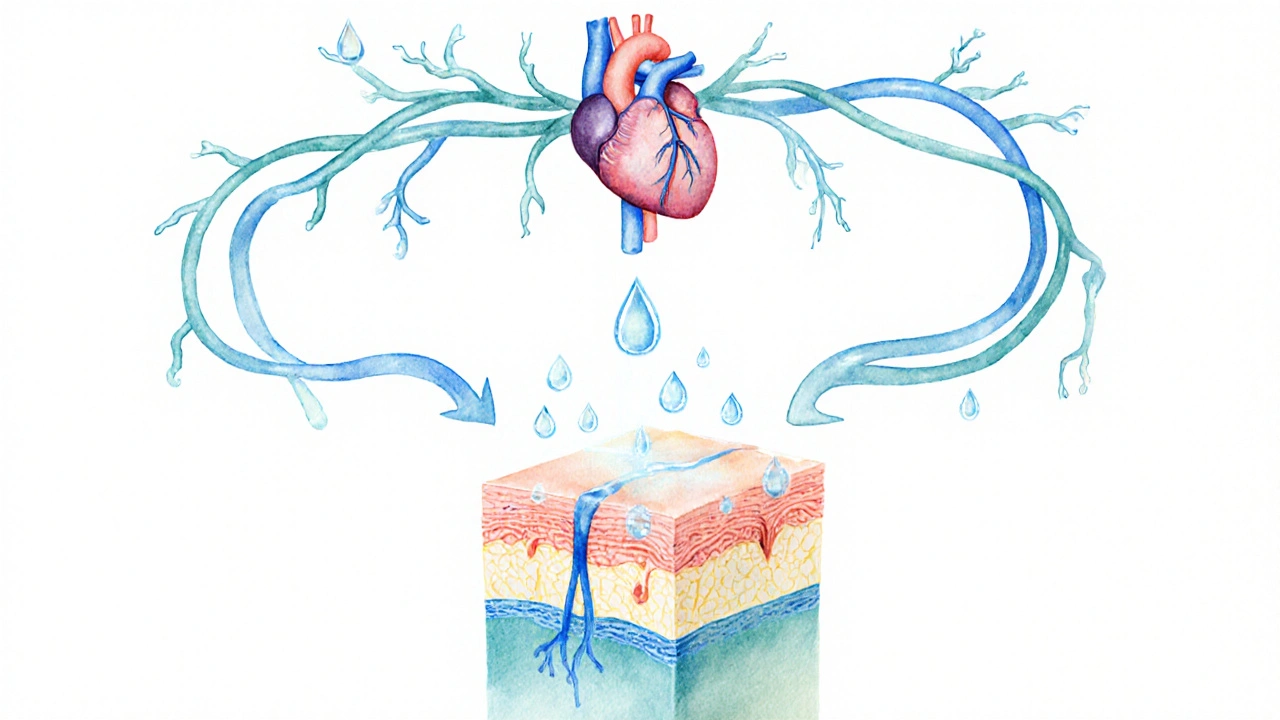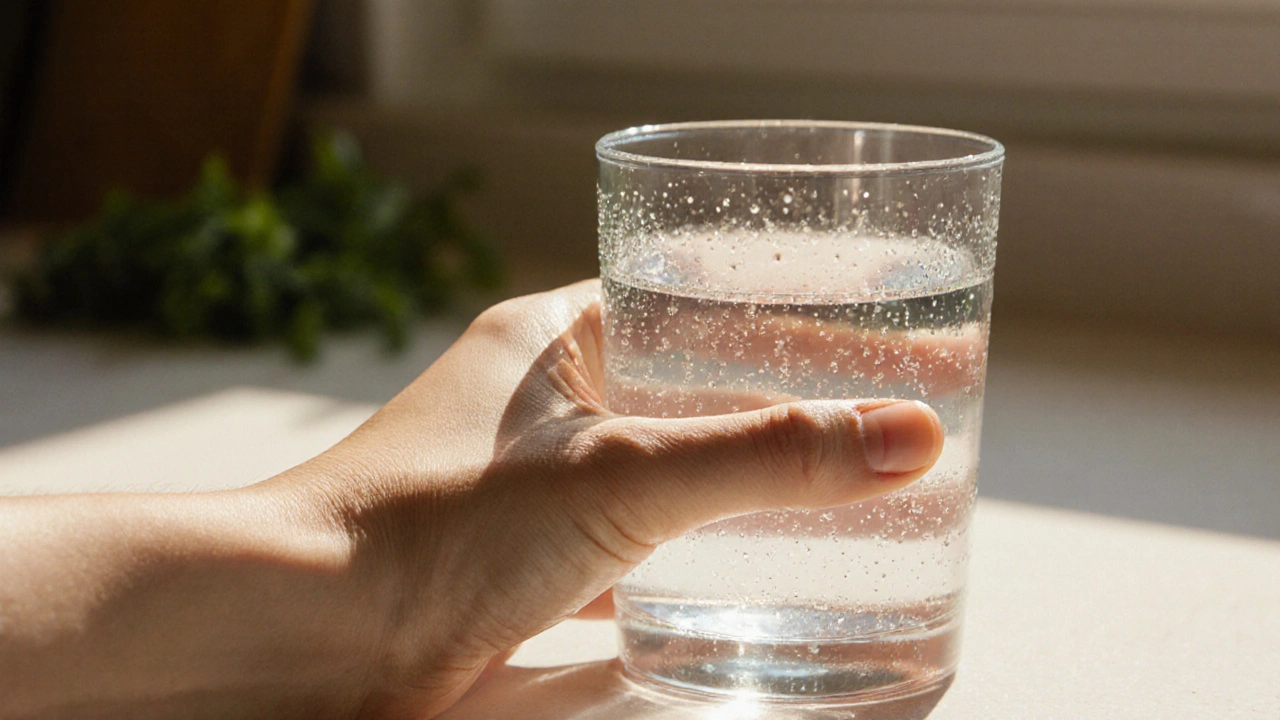Hydration & Dermatitis Calculator
Your Daily Water Needs
Your Hydration Status
--
Recommended daily water intake (liters)
Current Intake:
0 L
Status: Not Calculated
Hydration Tips:
- Drink water before meals
- Include water-rich foods in your diet
- Monitor urine color (pale yellow is ideal)
- Use a reusable water bottle to track intake
Dermatitis Prevention Checklist

Key Takeaways
- Proper internal hydration keeps the skin barrier strong, lowering the risk of dermatitis flare‑ups.
- Drink 2.5-3L of water daily for most adults, but adjust for activity, climate, and health condition.
- Combine water intake with topical moisturizers, humidifiers, and a skin‑friendly diet for best results.
- Severe or persistent dermatitis may need medical treatment even with optimal hydration.
- Use the checklist at the end to audit your hydration routine.
When the skin feels tight, itchy, or red, most of us reach for a cream or a prescription. But a simple habit you already do-drinking water-plays a far bigger role than you might think. Below you’ll learn how hydration the process of supplying adequate fluid to the body’s cells and tissues influences the skin’s defensive barrier and why that matters for preventing and treating dermatitis an inflammation of the skin that can appear as redness, itching, scaling, or blisters.

ADETUNJI ADEPOJU
October 11, 2025 AT 12:11Oh, the sheer hubris of believing that a solitary glass of H2O could single‑handedly neutralize a multifactorial immunopathology. The stratum corneum’s barrier function hinges upon a sophisticated interplay of osmotic homeostasis, cytokine regulation, and lipid matrix integrity. Yet, some zealots cling to the naїve thesis that hydration alone constitutes a panacea for dermatitis. One must also address systemic xerosis, hyaluronic acid depletion, and protease cascade activation that precipitate xerotic eruptions. In short, your hydration regimen is but a drop in the ocean of comprehensive dermatologic stewardship.
Janae Johnson
October 11, 2025 AT 12:28While the popular narrative glorifies increased fluid consumption, the peer‑reviewed literature offers only scant correlation between water intake and eczema remission. A judicious protocol foregrounding evidence‑based topical agents and barrier repair may yield superior outcomes compared to an exclusive focus on hydration.
Kayla Charles
October 11, 2025 AT 13:01Hey everyone, I wanted to take a moment to expand on why staying properly hydrated can be a cornerstone of skin health, especially for those of us battling dermatitis. First off, water is essential for maintaining the elasticity of the epidermis; when cells are well‑hydrated, they can better resist the mechanical stress that often triggers flare‑ups. Second, adequate fluid intake supports the production of natural moisturizing factors (NMF) within the skin, which act like a built‑in humectant, pulling moisture from the environment into the deeper layers of the skin. Third, staying hydrated assists in the optimal functioning of the lymphatic system, which helps clear inflammatory mediators that can exacerbate itching and redness.
Additionally, drinking enough water can improve overall circulation, delivering essential nutrients and oxygen to skin cells and facilitating more efficient repair processes. It’s also worth noting that dehydration can exacerbate the perception of itch, making a seemingly minor irritation feel far more uncomfortable. By keeping your internal hydration levels stable, you may notice a reduction in that endless cycle of scratching and further irritation.
Beyond the physiological aspects, there’s a psychological benefit too: the act of taking regular water breaks can serve as a mindful pause, allowing you to assess your skin’s condition before reaching for a potentially irritating cream. In practice, aim for two to three liters of water a day, adjusting for activity level, climate, and personal health factors. Pair this habit with a consistent moisturizing routine-preferably using ceramide‑rich or hyaluronic‑acid‑based products-to reinforce the skin barrier from the outside in.
Remember, while hydration isn’t a cure‑all, it’s a low‑cost, low‑risk component of a holistic approach that combines diet, topical care, and environmental controls. So raise that glass, stay consistent, and watch your skin thank you over time.
David McClone
October 11, 2025 AT 13:18Sure, just chug a gallon of water and watch your eczema vanish like a magician’s rabbit-because the skin’s barrier is apparently powered by a tiny internal fountain. If only it were that simple, we’d all be sipping from the Niagara Falls 24/7.
Jessica Romero
October 11, 2025 AT 14:00Listen, I get the hype around staying moisturized from the inside out, but let’s not pretend that guzzling H2O magically patches up a compromised lipid matrix. The epidermal barrier is a complex architecture involving ceramides, cholesterol, and free fatty acids-components you can’t just conjure with a water bottle. That said, neglecting systemic hydration can exacerbate transepidermal water loss, especially in arid climates where the air itself saps moisture from the skin’s surface. So, while the primary focus should remain on topical emollients-think ceramide‑rich creams and occlusive ointments-maintaining a baseline fluid intake is a sensible adjunct. Consider tracking your urine color, aiming for that pale‑yellow sweet spot; it’s a quick, low‑tech gauge of overall hydration status. Pair that with regular use of a humidifier in your bedroom, and you’ve got a decent two‑pronged strategy that tackles both the internal and external fronts without relying on any miracle‑water myth.
Michele Radford
October 11, 2025 AT 14:16Let’s cut the fluff: promoting water intake as a primary therapy for dermatitis borders on pseudoscience. The skin’s pathology is driven by immune dysregulation, barrier dysfunction, and external irritants-not merely a deficit of H2O. While staying hydrated is generally good for health, positioning it as a cure-all distracts from evidence‑based interventions like topical steroids, calcineurin inhibitors, and proper avoidance of allergens.
Mangal DUTT Sharma
October 11, 2025 AT 14:33Hey folks 😊, I totally understand where you're coming from. I've struggled with chronic eczema myself, and what helped me the most was a combination of consistent water intake and mindfulness about my skin routine. Drinking water kept my body from feeling dry, which in turn reduced the urge to scratch. I also made a habit of setting reminders on my phone to sip water every hour-little steps add up! Alongside that, I used a gentle, fragrance‑free moisturizer right after showering, which sealed in the hydration. Over time, I noticed less redness and fewer flare‑ups. It’s not a miracle cure, but it’s a solid piece of the puzzle. Stay kind to your skin and yourself! 🌿
Gracee Taylor
October 11, 2025 AT 15:23I appreciate the diverse perspectives here and think a balanced approach is key. Hydration certainly supports overall health, yet we must also prioritize proven topical treatments and environmental controls. Combining these strategies can create a synergistic effect that benefits skin integrity.
Leslie Woods
October 11, 2025 AT 15:40hydration is good but dont forget moisturizers they lock in moisture and protect the barrier also limit caffeine and alcohol they can dehydrate the skin overall it's a combo of internal and external care
Manish Singh
October 11, 2025 AT 15:56i totally agree with the last comment i think its really importnt to stay hydrated and also use a good cream its like a two way street you cant just focus on one side also using a humidifier in dry rooms can help keep the skin from drying out
Jim McDermott
October 11, 2025 AT 16:46Hey all, just wanted to chime in and say that while drinking enough water is definitely a good habit, pairing it with a solid skincare routine-like using a gentle, fragrance‑free moisturizer right after a lukewarm shower-can really make a difference for dermatitis sufferers.
Naomi Ho
October 11, 2025 AT 17:03Drink water, use a moisturizer, and monitor your skin’s response.